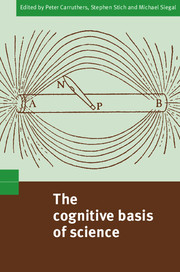Book contents
- Frontmatter
- Contents
- List of contributors
- Preface
- 1 Introduction: what makes science possible?
- Part one Science and innateness
- 2 Human evolution and the cognitive basis of science
- 3 Modular and cultural factors in biological understanding: an experimental approach to the cognitive basis of science
- 4 The roots of scientific reasoning: infancy, modularity and the art of tracking
- Part two Science and cognition
- Part three Science and motivation
- Part four Science and the social
- References
- Author index
- Subject index
4 - The roots of scientific reasoning: infancy, modularity and the art of tracking
Published online by Cambridge University Press: 23 November 2009
- Frontmatter
- Contents
- List of contributors
- Preface
- 1 Introduction: what makes science possible?
- Part one Science and innateness
- 2 Human evolution and the cognitive basis of science
- 3 Modular and cultural factors in biological understanding: an experimental approach to the cognitive basis of science
- 4 The roots of scientific reasoning: infancy, modularity and the art of tracking
- Part two Science and cognition
- Part three Science and motivation
- Part four Science and the social
- References
- Author index
- Subject index
Summary
This chapter examines the extent to which there are continuities between the cognitive processes and epistemic practices engaged in by human hunter – gatherers, on the one hand, and those which are distinctive of science, on the other. It deploys anthropological evidence against any form of ‘no-continuity’ view, drawing especially on the cognitive skills involved in the art of tracking. It also argues against the ‘child-as-scientist’ accounts put forward by some developmental psychologists, which imply that scientific thinking is present in early infancy and universal among humans who have sufficient time and resources to devote to it. In contrast, a modularist kind of ‘continuity’ account is proposed, according to which the innately channelled architecture of human cognition provides all the materials necessary for basic forms of scientific reasoning in older children and adults, needing only the appropriate sorts of external support, social context and background beliefs and skills in order for science to begin its advance.
Introduction
It needs no emphasis that there has been a staggering and explosive increase in scientific knowledge, together with associated technological ability, over the last five centuries. But to what extent has this depended upon extrinsic cultural – economic factors, and to what extent upon intrinsic cognitive ones? Undoubtedly changes of both kinds have taken place, and have played a significant role. The invention of the printing press, and the existence of a class of moneyed gentlemen with time to devote to systematic scholarship and scientific enquiry were surely important; as were new inferential practices – both mathematical, and those distinctive of the experimental method.
- Type
- Chapter
- Information
- The Cognitive Basis of Science , pp. 73 - 96Publisher: Cambridge University PressPrint publication year: 2002
- 30
- Cited by



